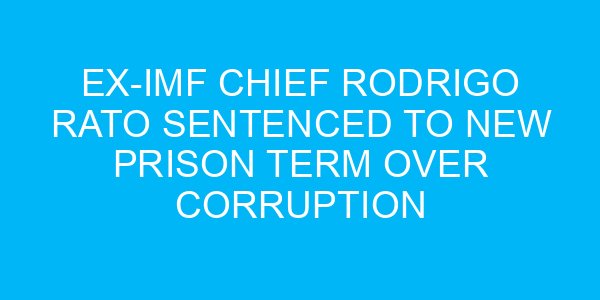Former International Monetary Fund (IMF) chief Rodrigo Rato has been sentenced to nearly five years in prison by a Madrid court for corruption-related crimes. The 75-year-old, who has faced multiple legal battles over the years, was convicted on charges of tax fraud, corruption, and money laundering following a lengthy investigation and trial.
Details of the Sentence
- Prison Term:
- Rato was sentenced to four years, nine months, and one day in prison for his offences.
- The court found him guilty of multiple financial crimes, including tax evasion and laundering illicit funds.
- Financial Penalties:
- Ordered to pay €2 million in fines.
- Required to reimburse €568,413 to Spanish tax authorities.
- Appeal Process:
- Rato’s sentence is not immediately enforceable as he is eligible to appeal to the Supreme Court.
Background on Rodrigo Rato’s Legal Troubles
This new conviction adds to Rato’s tarnished legacy, which has already been marred by prior scandals:
- Previous Conviction (2017):
- Sentenced to two years in prison for embezzlement while chairman of Bankia.
- Misused corporate credit cards for personal expenses, including luxury items and holidays.
- Fraud Trial (2012):
- Acquitted of fraud charges related to Bankia’s listing on the stock market.
- Latest Case (2023):
- Prosecutors initially sought a 63-year sentence for 11 charges.
- Rato’s defense argued that his rights were violated during a 2015 raid on his home.
Charges and Convictions
The court convicted Rato of:
- Tax Fraud:
- Evading taxes by concealing assets and income from Spanish authorities.
- Corruption in the Private Sector:
- Engaging in illicit financial dealings outside public office.
- Money Laundering:
- Moving funds through illegal channels to disguise their origin.
Who is Rodrigo Rato?
- IMF Leadership:
- Served as Managing Director of the IMF from 2004 to 2007, succeeding Horst Köhler.
- Political Career:
- Deputy Prime Minister of Spain (1996–2004) under the conservative People’s Party government.
- Bankia Chairmanship:
- Headed Bankia, a major Spanish lender, between 2010 and 2012, which later required a significant bailout during Spain’s financial crisis.
Implications of the Verdict
- Loss of Reputation:
- Rato’s fall from grace highlights systemic challenges in political and financial governance.
- Accountability in High Office:
- The conviction underscores Spain’s ongoing efforts to hold public figures accountable for corruption.
- Future Legal Challenges:
- If the Supreme Court upholds the verdict, Rato may face further prison time and financial penalties.
Key Takeaways for Competitive Exams
- Global Financial Governance:
- Understand the role of international bodies like the IMF and their influence on member nations.
- Political Corruption Cases:
- Rato’s case is an example of financial misconduct by high-ranking officials, which can appear in essays and case studies.
- Judicial Processes in Spain:
- Spain’s legal framework for handling corruption cases, including appeals and financial penalties, is noteworthy.
Rodrigo Rato’s conviction serves as a reminder that no individual is above the law, reinforcing the importance of transparency and accountability in leadership roles.




